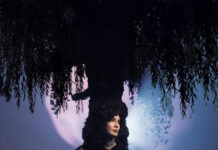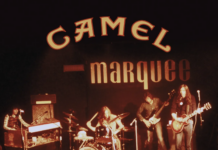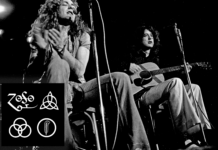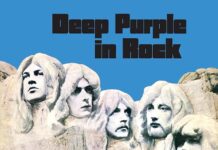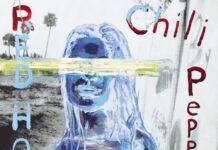Featuring the songs of Jethro Tull as written by band leader Ian Anderson, largely orchestrated and re-arranged by keyboard player John O’Hara (also of Tull and Anderson’s solo band) and chiefly featuring The Carducci Quartet as musicans, Jethro Tull – The String Quartets proves an interesting reinterpretation of songs that known by millions around the world, a number of them hit singles in their day.
The story goes that classical music and rock have long been uneasy bedfellows. A large part of this lies with the fact that Deep Purple scored big with their In Rock album resulting in their previous Concerto For Group And Orchestra being considered a failure (Despite the reality that record companies and concert halls would invite keyboard player Jon Lord to continue performing such works). Orchestra were often used to accompany early pop and rock ’n’ roll hits but they were costly and the development of keyboards like the mellotron negated their need. From the 80s on, orchestras began doing straight cover versions of classic rock bands’ works, tending to be neither fish nor fowl yet some sold in large quantities. More recent times have found rock bands taking Lord’s template and working with major conductors to adapt their work, Metallica and The Scorpions come to mind. In truth, only Jimmy Page and Robert Plant have ever made the combination work, by subverting both their own Led Zeppelin arrangements and allowing classical musicians to integrate and add freely to the resulting sounds, most other attempts come across as rock musicans trying to be taken seriously and classical musicans trying to look cool. The music itself is soon forgotten, it’s the musicans’ credibility that can fall into dispute.
Working with a smaller ensemble like a string quartet circumvents many of the problems, not simply by having to manage less people but also that the instrumentation can actually stand out. A gloriously magical version of the string quartet at work can be heard on the Colin Blunstone 70s hit single ‘Say You Don’t Mind’, a cover of Wings and Moody Blues’ singer/guitarist Denny Laine’s flower power original.
I’m not a huge Jethro Tull fan. My youth is blurred by memories of badly mimed camp folk rock on Top Of The Pops, but I’ve become more familiar with their works during the interceding decades and some of the performances here are really quite impressive. A large part of this I would consider being down to O’Hara’s arrangements as classic melody lines remain but the quality of the quartet shines throughout and you listen carefully, committed as a listener to where the music takes you, appreciating the results rather than it be felt passive background muzack. That Anderson wrote the songs originally, sings a few and adds flute here and there might not be enough for big Tull fans, but there you go.
True not everything is something to write home about (aside from this review), the odd one so short ones wonders why they bothered, and on the occasional merging of two different songs into one (wherein for reasons of simplicity I will list the originals in parenthesis) the more familiar of the two is the one most dominant. Regardless, on the whole it succeeds under its own terms as fine music.
Opening with one of the best tracks on the record, ‘In The Past’ (‘Living In The Past’) is something of a coy ballet, instruments performing in unison then dipping and diving like a conversation where one tries to catch the other out, with a quiet narrative between. There is a certain charismatic gypsy violin flavour that comes to the forefront playing out the hit single’s flute and lyrical melodies while the other instruments pluck steadfast in accompaniment; the score dramatically determined in a slow serious manner as if debating with question and answer, then giving chase musically. However you interpret the music’s intention the fact is you listen. The song is familiar to millions, a hit single played on national radios down the decades, and despite flute being prevalent the original was a big ballsy macho tune, and here it subverts that come-on with a much more sensuous flirtation.
Instruments feed into and support each other with a soft questioning tone evoking all we think of as folk medieval in manner on ‘Sossity Waiting’ (‘Sossity: You’re A Woman’/’Reasons For Waiting’) up until around the 3.20 mark wherein Anderson begins to sing and it veers more towards s courtly dance, ‘Bungle’ (‘Bungle In The Jungle’) follows as slow aching musical search leading to proud procession, and the opening to ‘We Used to Bach’ (‘We Used to Know ‘/’Bach Prelude C Major’) is fluid and flowery with piano tinkling pleasantly underneath when the vocals appear, a violin soloing sparingly then flute in more profound mode. They are what you might expect though, whereas ‘Farm, The Fourway’ (‘Farm On The Freeway’) is beautiful and all too brief: a solo violin soars in striding, skipping and leaping throughout with strong bow work, the ensemble in strong accompaniment, most especially the cello.
Another short, and lesser, number is the Anderson ‘Only the Giving’ (‘Wond’ring Aloud’), while the Yuletide season comes in large supply first with ‘Pass the Bottle’ (‘A Christmas Song’) that has a vintage Tull flavour and later with ‘Ring Out These Bells’ (‘Ring Out, Solstice Bells’) where Anderson’s voice is far less to the forefront than the original single, and this version is strident, played with dedicated precision but also emotion.
‘Songs and Horses’ (‘Songs from the Wood ‘/’Heavy Horses’) merges two well known numbers and while this arrangement may not take you to the heights and drama of the source material I do prefer the violin’s evocative performance of the lyrical lines to ‘Songs From The Wood’. Whereas the big rollicking riff of the much covered ‘Loco’ (‘Locomotive Breath’) may not be present the song here is another highlight on the album. A long mournful introduction draws the listener’s attention and then when the true breadth of the song comes in the accentuation of instruments in staccato movement with a profound violin playing the melody is truly something.
The first part of ‘Velvet Gold’ (‘Velvet Green’) while beautifully played goes off at tangents developing more fluently latterly and so segues well into ‘Aquafugue’ (‘Aqualung’) , its heavy guitar riff played by the quartet here with the instruments shadowing each other’s melody then developing a sinister edge of deep questioning, a certain mistrust and eventual resolution.
Exquisitely played, inspiringly so at times; even those songs less pleasing are not bad. Well worth listening to, time and again.




